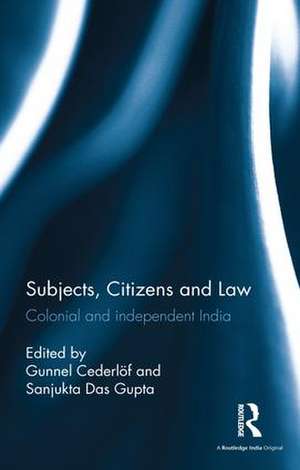Subjects, Citizens and Law: Colonial and independent India
Editat de Gunnel Cederlöf, Sanjukta Das Guptaen Limba Engleză Hardback – 28 oct 2016
Representing scholarship in history, anthropology and political science that draws on wide-ranging field and archival research, the volume will immensely benefit scholars, students and researchers of development, history, political science, sociology, anthropology, law and public policy.
| Toate formatele și edițiile | Preț | Express |
|---|---|---|
| Paperback (1) | 416.22 lei 6-8 săpt. | |
| Taylor & Francis – 25 apr 2019 | 416.22 lei 6-8 săpt. | |
| Hardback (1) | 1059.14 lei 6-8 săpt. | |
| Taylor & Francis – 28 oct 2016 | 1059.14 lei 6-8 săpt. |
Preț: 1059.14 lei
Preț vechi: 1291.63 lei
-18% Nou
Puncte Express: 1589
Preț estimativ în valută:
202.66€ • 212.17$ • 167.69£
202.66€ • 212.17$ • 167.69£
Carte tipărită la comandă
Livrare economică 05-19 aprilie
Preluare comenzi: 021 569.72.76
Specificații
ISBN-13: 9781138228443
ISBN-10: 1138228443
Pagini: 228
Ilustrații: 2
Dimensiuni: 138 x 216 mm
Greutate: 0.58 kg
Ediția:1
Editura: Taylor & Francis
Colecția Routledge India
Locul publicării:Oxford, United Kingdom
ISBN-10: 1138228443
Pagini: 228
Ilustrații: 2
Dimensiuni: 138 x 216 mm
Greutate: 0.58 kg
Ediția:1
Editura: Taylor & Francis
Colecția Routledge India
Locul publicării:Oxford, United Kingdom
Public țintă
PostgraduateCuprins
Acknowledgements
List of contributors
List of abbreviations
Becoming and being a subject: an introduction
GUNNEL CEDERLÖF
1 The making of subjects on British India’s North-Eastern Frontier
GUNNEL CEDERLÖF
2 The temperament of empire: law and conquest in late 19th-century India
JON WILSON
3 Contagious contestations: sex work, medicine and law in colonial and postcolonial Sonagachhi
SIMANTI DASGUPTA
4 Laws and colonial subjects: the subject–citizen riddle and the making of section 295 (A)
NISHANT KUMAR
5 A homeland for ‘tribal’ subjects: revisiting British colonial experimentations in the Kolhan Government Estate
SANJUKTA DAS GUPTA
6 Conflict and governance: participation and strategic veto in Bihar and Jharkhand, India
AMIT PRAKASH
7 Refugees in India: a study into (un)equal status, treatment and prospects
ANNE-SOPHIE BENTZ
8 Law, agro-ecology and colonialism in mid-Gangetic India, 1770s–1910s
NITIN SINHA
Subjects, citizens and law: a postscript
TANIKA SARKAR
Glossary
Bibliography
Index
List of contributors
List of abbreviations
Becoming and being a subject: an introduction
GUNNEL CEDERLÖF
1 The making of subjects on British India’s North-Eastern Frontier
GUNNEL CEDERLÖF
2 The temperament of empire: law and conquest in late 19th-century India
JON WILSON
3 Contagious contestations: sex work, medicine and law in colonial and postcolonial Sonagachhi
SIMANTI DASGUPTA
4 Laws and colonial subjects: the subject–citizen riddle and the making of section 295 (A)
NISHANT KUMAR
5 A homeland for ‘tribal’ subjects: revisiting British colonial experimentations in the Kolhan Government Estate
SANJUKTA DAS GUPTA
6 Conflict and governance: participation and strategic veto in Bihar and Jharkhand, India
AMIT PRAKASH
7 Refugees in India: a study into (un)equal status, treatment and prospects
ANNE-SOPHIE BENTZ
8 Law, agro-ecology and colonialism in mid-Gangetic India, 1770s–1910s
NITIN SINHA
Subjects, citizens and law: a postscript
TANIKA SARKAR
Glossary
Bibliography
Index
Notă biografică
Gunnel Cederlöf is Professor of History at the Linnaeus University, Centre for Concurrences in Colonial and Postcolonial Studies, Sweden. Her work focuses on social, environmental and legal history in Indian modern and British Imperial history. Among her publications are Founding an Empire on India’s North-Eastern Frontiers, 1790–1840: Climate, Commerce, Polity (2014); Landscapes and the Law: Environmental Politics, Regional Histories, and Contests over Nature (2008); Ecological Nationalisms: Nature, Livelihoods and Identities in South Asia (with K. Sivaramakrishnan, 2006); and Bonds Lost: Subordination, Conflict and Mobilisation in Rural South India, c. 1900–1970 (1997).
Sanjukta Das Gupta is Associate Professor of Modern and Contemporary Indian History at the Department of Italian Institute of Oriental Studies, Sapienza University of Rome, Italy. Earlier she taught at the University of Calcutta, India. She is the author of Adivasis and the Raj: Socio-economic Transition of the Hos, 1820–1932 (2011) and has co-edited Narratives of the Excluded: Caste Issues in Colonial India (2008) and Narratives from the Margins: Aspects of Adivasi History in India (2012).
Sanjukta Das Gupta is Associate Professor of Modern and Contemporary Indian History at the Department of Italian Institute of Oriental Studies, Sapienza University of Rome, Italy. Earlier she taught at the University of Calcutta, India. She is the author of Adivasis and the Raj: Socio-economic Transition of the Hos, 1820–1932 (2011) and has co-edited Narratives of the Excluded: Caste Issues in Colonial India (2008) and Narratives from the Margins: Aspects of Adivasi History in India (2012).
Descriere
This volume investigates how, where and when subjects and citizens come into being, assert themselves, and exercise subjecthood or citizenship in the formation of modern India. It argues for the importance of understanding legal practice—how rights are performed in dispute and negotiation—from the parliament and courts to street corners and field sites. The essays in the book explore themes such as land law and rights, court procedure, freedom of speech, sex workers’ union rights, refugee status, adivasi people, and non-state actors, and bring together studies from across north India, spanning from early colonial to contemporary times.
